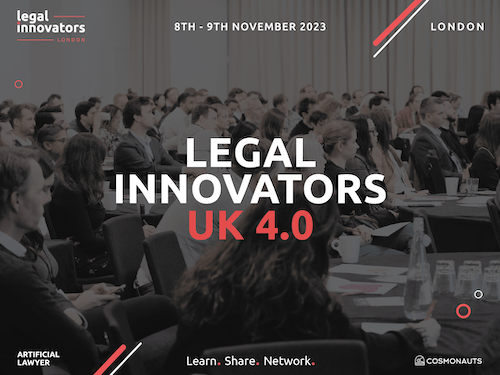
In this Speaker Profile ahead of Legal Innovators in London, November 8 + 9, Robert Dilworth, Associate General Counsel at Bank of America in New York, talks about his personal journey through the field of legal innovation and the transformation of the inhouse world, ranging from societal responsibilities, to generative AI, to personal growth and upgrading his ‘hOS’ or human operating system.
—
What is your role, and how did you get into this field?
First, I thank Artificial Lawyer and Cosmonauts for inviting me to participate again this year. Thoughts in this Speaker Profile are solely personal.
I’m a derivatives, banking, and securities lawyer, and the Liquid Legal Institute think-tank’s ambassador to North America. I followed a traditional path – law school in the US and France, a Wall Street law firm (Cleary Gottlieb), in-house at Deutsche Bank in New York and Frankfurt, and now my current role. I discovered derivatives before standardisation, automation, or ISDA – papering each transaction required a lawyer and was bespoke.
Today, the businesses I support epitomize the societal trends that drive the urgent need for innovation and transformation in the legal sector: ‘more for less’ pressure, incessant volumes, the need for scalability far beyond human 1:1 capacity, substantive and legal complexity from constant product innovation, increased regulation, and data-intensity, especially for regulatory data.
What led you to an innovation and transformation path?
I’m an independent, divergent thinker and a curious, early tech adopter. The pandemic lockdowns – spent mainly in Europe – catalysed these traits into action. As with many people, I thought deeply about purpose and discovering new meaning in my career. It was the right time and place – despite the daily tragedies worldwide, this became a time of renewal and growth.
I embarked on a learning spree – books, articles, ideas, and people discussed in Artificial Lawyer, online events and meetings with the leading global futurists, programmes of the Bucerius Law School in Hamburg, engagement with the Digital Legal Exchange and the use of design thinking techniques to reframe some of my accepted truths – were all formative. I returned to New York committed to sharing my learnings with colleagues, advocating an innovation and modernisation agenda.
What else drives this interest?
There’s a broader context. Our collective efforts can strengthen the role of law in society and sustain the rule of law. Companies having at least one lawyer drive more than half of all legal spending globally. Just as industrial innovation informs consumer innovation, legal transformation in the corporate world can translate to greater effectiveness of law throughout civil society.
How much has your role changed in the last five years, and how much do you think it will change in the next five years?
My substantive legal work and means haven’t yet changed much. But how I think about my role and career has evolved radically. I can change myself; I can improve today and help build tomorrow. I can upgrade my hOS (human operating system) and by my example, show others that lawyers of any age or generation can have a renaissance in mindset, skills, purpose and outlook.
As to the next five years or so, I hope for at least as much change in my and other legal practices as in the last twenty-five. We’ll leverage and expand our innovative learnings in the contentious and investigative worlds to our transactional, regulatory, and advisory practices. We’ll be more data literate and informed, develop more scalable solutions, and empower clients by embedding more advice into self-service and automated tools.
We’ll enable more value and spend more time practicing law at higher points on our license. Those who succeed the most will be more client-centric and less lawyer-centric. Our near future provides vast humanising potential by elevating our craft and workday balance and making law more accessible generally.

Do you think that we have reached a ’new era’ for legal innovation, with forces such as generative AI, standardisation and rethinking legal work catalysing real change?
It’s a paradigm shift. Many lawyers expect continuity and incremental change because the law (our ‘what’) typically trails societal change, it’s reactive. As with other knowledge work, the business and practice of law (our ‘how’) is different; discontinuity and disruption are more likely. Inaction has a greater risk than previously. It will become harder to hide from modernity; our deficits risk being laid bare.
Recent and expected advances (near zero computing, storage and transmission costs, GenAI, quantum computing) create enormous opportunity and responsibility for us and society. In the rest of our business and personal lives, standardisation, norms, and smart-sourcing of related tasks are recognized as essential, not resisted. Our business clients rightfully expect this from other service providers — internal or external.
GenAI’s strengths are uniquely suited to the legal profession since law is language-based —words are coin of the realm and our stock in trade. At an absolute minimum, there will be fewer unintuitive, multi-step tech interfaces that we can use as an excuse to resist adoption. Our social responsibility is to become future-fit, 21st-century legal professionals. The world urgently needs us to participate in the public dialog about the many societal questions that these opportunities present.
From an in-house perspective, do you feel the balance of power is shifting more to the clients now as inhouse legal teams grow in size?
Shift happens. There is a tremendous opportunity for those who recognize it and adapt. By 2030 (at the latest), I’d expect a significant buyer-centric rebalancing for much ordinary course corporate work. This is not due to the ratio of internal to external counsels per se (internal headcount may remain under pressure). Rather, it’s due to how all successful counsels, allied professionals, and other knowledge workers will work. Upskilled, re-tooled, purpose and future-fit legal departments and ALSPs could challenge the traditional law firm business model’s premises for some of this work. Or simply have additional credible choices among capable providers.
Of course, there will always be a need for a partner’s nuanced, seasoned human judgment for highly specialized or novel questions and a law firm’s resources when a corporate client has intermittent, unpredictable, urgent needs. In these cases, the supply-demand balance is different.
How much will improving KM and data analytics inside the business help your legal team?
It should become of defining importance in any legal practice. Memos, opinions, e-mails, and other documents embed learnings and advice; they are assets of the shareholders and clients who pay for them. Enhanced ability to find and mine these assets unlocks embedded intelligence and powers insights. It increases productivity and helps lawyers broaden their value narrative by using the language of business to prove that we both control risk and enable business. GenAI should be a substantial boost in interrogating data in ways native to us and getting better, longer use from legacy stacks and unstructured data forms.
Do you have a view on the billable hour, and if so, what would you like to see happen?
Time spent is a proxy for value and is used in many service businesses. It isn’t per se, unreasonable. But it did not come down from Mt. Sinai with Moses and the Ten Commandments, it originated in a mid-industrial age context, place and time to serve a purpose when most work was manual and bespoke. Its near-exclusive use in an advanced information age can evolve, particularly where it disincentivises client-focused innovation.
And finally, if you had one message you’d like to share about how to achieve successful change management in relation to legal innovation, what would it be?
Daily vitamin C: It’s all about culture.
Curiosity, courage, communication, collaboration, commitment, consistency, champions, carrots, and consequences are key to cultural change. Innovation occurs in a social construct, starting with the person lifting the first flame in a dark stadium. Communicate what’s in it for each person asked to change. Model leadership behaviour consistent with the goals. Use incentives, lead with persuasion, but consider consequences. Share your learnings and wins broadly; champions shouldn’t under-appreciate the power of storytelling as creative advocacy, even if this isn’t one’s usual style. Authenticity is your brand and influence. Other flames will join, just not immediately or together.
Thanks Robert for sharing your story and your insights. Look forward to hearing you speak at Legal Innovators in November!
—
Legal Innovators Conference – November 8 + 9 – London
The Legal Innovators conference will be a landmark event exploring a range of key issues with high-level speakers from across the legal innovation ecosystem. The event will take place on 8 + 9 November in London. Day One: law firms and ALSPs, Day Two: inhouse and legal ops.
For tickets, please see here.
Here is a list of our great speakers so far: please see here.
And here are the wonderful group of sponsors: please see here.
While for general information: please see here.
The two-day event comes at a time of significant change for the legal market and we will be bringing you engaging panels and presentations where leading experts really dig into the issues of the day, from generative AI, to the evolution of ALSPs, to law firm innovation teams in this new era for legal tech, to how empowered legal ops groups and pioneering GCs are making a real impact. And as always, I’ll be there and chairing the event.
See you there!
Richard Tromans, Founder of Artificial Lawyer and Conference Chair.